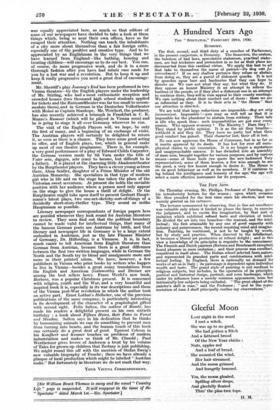A Hundred Years Ago
The first, second, and third duty of a member of Parliament, in the present conjecture, is Eccinomy. The financiers, the orators, the botchers of bad laws, speculative statesmen, practical states- men, are but tricksters and pretenders in so far as their plans are disconnected from this cardinal virtue. We apply this test to all that take to themselves the name of patriot—Do they vote for retrenchment ? If on any shallow pretence they refuse or abstain from deing so, they are a parcel of dishonest quacks. It is not by speeches upon beer and banknotes that they can hope to deceive us. We care not what they say, but what they do. If they oppose an honest Ministry in an attempt to relieve the burdens of the people, or if they abet a dishonest one in an attempt to continue them, they will in vain appeal to their county meetings. We care nothing about their conduct out of doors : there we am as influential as they. It is to their acts in " the House " that our attention is directed.
We are told that large reductions are impossible—they are only inconvenient. Impossible !—you may as well tell us that it is impossible for the plunderer to abstain from robbery. Their talk is idle who speak thus ; such impossibilities are got over every session. Who opposes economy ? The Ministry.? Dare they ?- They stand by public opinion. It ie as the air they breathe— withhold it and they die. They have no party but what their good conduct has gained. Their character lost; -their all is lost.
No one now approves the House of Commons, but in so far as it merits approval by its deeds. It has lost for ever all meta- physical claims to our veneration. It is no longer a mysterious and unapProachable essence. It has dwindled into an assembly of mere men, brought together for various purposes, and by various means—some of them fools (we quote the new-fashioned Tory representation), some of them knaves, a few wise enough to see the good, a very few honest enough to desire it. it House is on its good behaviour as well as its members. If 'it ecintinue to lag behind the intelligence and honesty of the agei'llie age' will select a, more effective instrument for its purposes.
Tau
On Thursday. .evening, Mr. Phillips, Professor of Painting, gave his introductory lecture for the season ; upon which-occasion Mr. Shee presided for the first time since his election;' and was
warmly greeted on his entrance. • •
The lecturer commenced by observing, that in fine art excellence was valuable only where it tended to please the, fancy, to exercise the judgment, and to excite the imagination, by that sort of imitation which exhibited refined taste and elevation of mind. He divided the art into two branches—the manual, and the intel- lectual ; the first attainable by any one of good capacity with industry and perseverance, the second requiring mind and imagina- tion. Painting, he continued, is not to be taught by words, but by study and practice. When directed to the intellectual, it becomes a liberal art productive or refined delight ; and in this view a knowledge of its principles is requisite to the connoisseur. The Flemish and Dutch painters (Ruben and Rembrandt inceepted) found pleasure in mere imitation ; and their process was excellent, considered in itself alone. The Italian school selected from nature, and represented its grandest parte and combinations with intel- lectual feeling. In England, there is nationally no &Mind for works of art as in Italy ; its patronage is dependent upon individual wealth and taste. The grand style of painting is not confined to religious subjects, but includes, in the operation of its principles, poetical and historical design, portrait, and even landscape, which ender its influence loses a merely common appearance, none but intrinsically low subjects being excluded. " The great object of -the painter's skill is man," said the Professor ; " and to the repre- sentation of man I shall principally confine my observations."










































 Previous page
Previous page